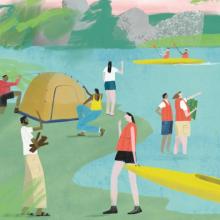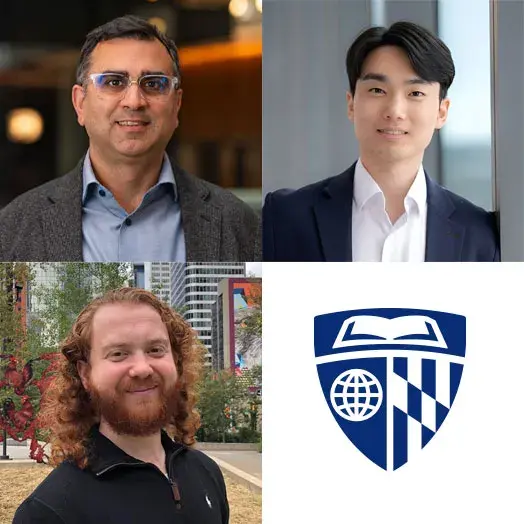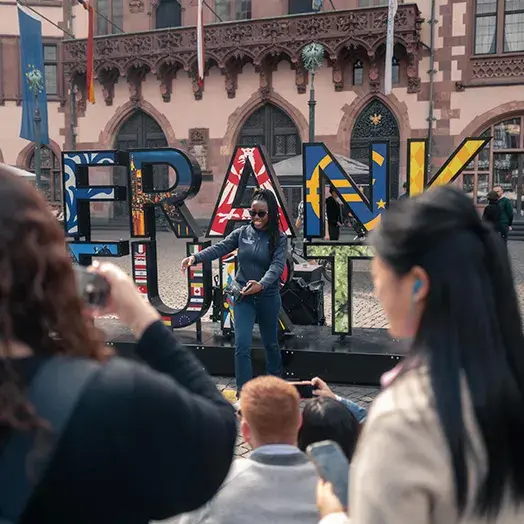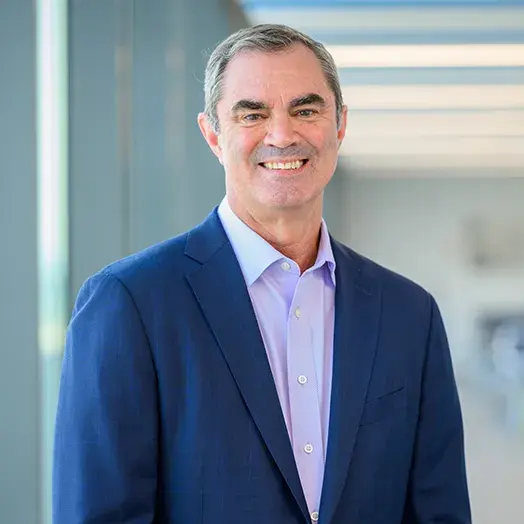The Office of Experiential Learning creates innovative, immersive projects to provide Carey students with real-world business skills.
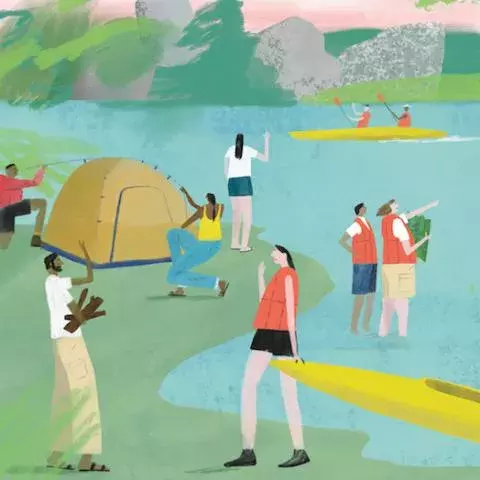
Speaking from experience
It’s 6 p.m. on a February evening in the Johns Hopkins Bayview Emergency Department. The waiting room is full, but the floor is calm – for now. As the sun sets and ambulances rush in patients, the Emergency Department doctors, nurses, physician assistants, and techs transform chaos into choreographed care.
And tonight, 12 Carey Business School students are in the middle of it all.
They are here as part of an experiential learning “Impact Sprint.” The 24-hour challenge embedded the students in the emergency department to find a solution to one of the hospital’s complex business challenges: How can hospital staff improve communication when sharing critical information between shift changes? A streamlined process will strengthen the patient experience while bolstering a healthy work culture built on trust.
Johns Hopkins hospitals are accustomed to students and see residents, interns, and all levels of doctors and nurses in training circling through on a regular basis – especially in February, well before the COVID-19 pandemic. But a group of business school students on the floor with doctors is novel. These innovative, immersive experiences are devised and provided to Carey students by the school’s Office of Experiential Learning.
“Experiential learning offers opportunities to apply the models and theories students learn in their classes in a real-life setting. Not only do our students know the theories and models, but through experiential learning, they do the work under faculty and industry experts who give continuous and involved feedback.”
Michael Doyle
Experiential learning, the process of learning by doing, dates back to the very founding of Johns Hopkins University, in 1876. When the university’s founder, Johns Hopkins, wanted to build a hospital, he traveled around the world to learn from other institutions. The roll-up-your-sleeves, immersive approach is squarely in the Johns Hopkins tradition.
From its inception more than a decade ago, Carey Business School has made experiential learning a key component of its course offerings, culminating in 2018 with the formal launching of the experiential learning office. Since then, the office has grown to oversee more than 17 courses, 19 student organizations, over 50 non-credit or student organization events, and numerous case competitions each year.
Michael Doyle, director of experiential learning, says, “Experiential learning offers opportunities to apply the models and theories students learn in their classes in a real-life setting. Not only do our students know the theories and models, but through experiential learning, they do the work under faculty and industry experts who give continuous and involved feedback.”
The Impact Sprint that placed 12 Carey students in the emergency department at Bayview was just one of these opportunities. Students spent their shifts shadowing and interviewing medical staff and then testing their recommendations in real-time. The students then presented actionable recommendations to the emergency department leadership.
“Being on the floor allowed us to gain real experience of what it’s like to be under immense stress dealing with life-and-death situations while trying to manage teams and communicate with colleagues,” says Nike Panetta, a Flexible MBA student. “We were able to learn the staff’s motivations, strengths, and weaknesses, and fine-tune our recommendations based on direct feedback.”
Student plans included formalizing a cross-functional huddle of doctors, nurses, and physician assistants during shift changes. Another recommendation leveraged existing technology to create a staff directory so that traveling nurses and rotating staff integrate with the full-time staff more quickly.
Edward Bessman, chairman emeritus of emergency medicine at Johns Hopkins Bayview Medical Center and a Carey MBA alumnus ’11, was on the floor with the students and was one of the hospital staff members listening to the student recommendations.
“Some of the recommendations the teams made were similar to those we had previously identified. This confirms that they were on the right track,” Bessman says. “A few of the proposals were new and quite interesting, so I imagine that Emergency Department leadership will consider implementing one or more.”
Indeed, as is the case with almost all experiential learning opportunities at Carey, student recommendations are developed to be implemented. And as the school continues to design such opportunities, says Doyle, students benefit from a range of chances to hone their skills in environments that, they say, push them out of their comfort zones.
Signature Experiential Courses
The growth of Carey’s experiential learning corresponds with the surge in such programs at many business schools. And Carey’s MBA program, revised for fall 2020, is doubling down on its promise of these opportunities.
All Carey full-time MBA students now graduate with a minimum equivalent of four internships, with the option to take an unlimited number of additional experiential learning courses as electives.
And all full-time MBA candidates beginning this fall will take Innovation Field Project, the new signature MBA course. During the spring of their first year, students will spend five weeks in the classroom and up to three weeks on-site embedded at a client organization to solve a complex business problem.
Student projects are still being developed, but past experiential learning projects provide a sense of potential project scope. In a previous course, an established solar energy company with 90,000 customers was pursuing a new model of distributed irrigation systems for farmers in emerging economies. Carey students tested the concept with potential customers, adjusted the pricing model, and delivered new pricing and financial models to improve affordability for customers and profits for the company.
Brian Gunia, the full-time MBA academic program advisor and an associate professor, says, “The course represents the first major opportunity for the students to take what they’ve learned in their foundational Carey coursework out into the real world. Since that is where they’ll be going for their internships and jobs, it represents a critical step in their intellectual and professional development.”
Ozge Sahin, Innovation Field Project professor, says that the course pushes students beyond traditional client-facing opportunities.
“Unlike most MBA courses, students in Innovation Field Project are not only expected to solve a business problem. They first collect evidence using primary and secondary research methods to identify the client’s biggest challenge or opportunity,” says Sahin.
Innovation Field Project evolved from its predecessor, Innovation for Humanity, which launched in 2010 and required MBA students to help small businesses in emerging economies solve finance, supply chain, marketing, or other business challenges.
Throughout the course’s tenure, students have completed 170- plus projects in nine countries from Rwanda to Ecuador. While no longer a required course, it is being redesigned as an elective. Throughout the 10-year run of Innovation for Humanity, the experiential learning office translated the program successes, lessons learned, and opportunities into today’s best practices.
What Employers Want
All of Carey’s experiential courses are part of a sequential strategy to equip students with the skills today’s employers demand.
These skills include complex problem solving, critical thinking, and creativity, according to the 2018-2022 World Economic Forum “Future of Jobs” report, which tracks the workforce abilities that drive planning, hiring, training, and investment decisions, particularly at the world’s largest organizations.
The report predicts that “creativity, originality and initiative, critical thinking, persuasion and negotiation will likewise retain or increase their value, as will attention to detail, resilience, flexibility and complex problem solving. Emotional intelligence, leadership and social influence as well as service orientation also see an outsized increase in demand relative to their current prominence.”
Carey’s experiential course sequence allows faculty to collaborate with corporate partners to increase project complexity as students build new skills over time. Students apply new frameworks and strategies involving teaming, critical thinking, and creativity, coupled with new analytical skills, to address increasing complex business problems.
Dan Sheats
While many other business schools offer behavioral skills training through experiential learning, these trainings are often disconnected from other aspects of students’ curriculum, according to Christopher Myers, an assistant professor who co-teaches the school’s Leadership Development Expedition.
“As faculty and staff, we are aware of what students are doing and experiencing at Carey. We are able to integrate the experiential learning with other elements of their curriculum so that we can pick up where they left off in their leadership development and help them practice and apply the skills they started developing in the classroom,” Myers says.
Carey’s experiential learning staff and course faculty work lockstep with each other and corporate partners to deliver a student experience that translates into skills for the professional world.
Dan Sheats, director of curricular experiential learning, says, “Carey’s experiential course sequence allows faculty to collaborate with corporate partners to increase project complexity as students build new skills over time. Students apply new frameworks and strategies involving teaming, critical thinking, and creativity, coupled with new analytical skills, to address increasing complex business problems. By practicing these skills in a supported, sequential structure, students build the knowledge, experience, and confidence to take on opportunities throughout their careers.”
From Classroom to Field
Branden Anderson, Flexible MBA ’19, was looking for his next career move as he neared the end of his degree program. He was in the middle of the interview process for a senior human resources business partner position while kayaking through Belize’s waterways in the Leadership Development Expedition course.
In this popular course, students put their leadership skills to work when forced into challenging outdoor environments and out of their comfort zones.
Anderson’s cohort kayaked through Belize for nine days, with the students alternating responsibilities for navigation, cooking, and setting up camp.
Anderson, who served in the Army for over 20 years, says he was ready physically for the challenge but wasn’t expecting to come away with an entirely new set of “soft” skills.
“I was able to translate the experience and show that I gained leadership skills, feedback, awareness, empathy, and compassion – all of the soft skills that are actually really hard,” he says. “Most people don’t take opportunities to develop these skills. But it’s like exercise, and we can’t say we did it once and are good for the year. You have to do it extensively, or those muscles go to waste.”
He credits honing these soft skills on the Leadership Development Expedition as one of the final factors that helped him land his new position.
“You really learn about your resiliency,” he says. “Every Leadership Development Expedition has its own curveball. Half of our people got sick after drinking bad water. Others who hadn’t stepped into a leadership role yet really had to step up. That level of vulnerability when you’re already psychologically and physically vulnerable is a real test of your resiliency. I was able to take that experience and translate it into a business setting during my job interviews.”
The course was so influential for so many students that a group of Carey alumni started a Leadership Development Expedition alumni Facebook group. The Facebook group evolved into a weekend camping excursion in the Shenandoah Mountains in 2019, completely organized by the alumni, including Anderson.
The trip featured the typical outdoor accoutrements and activities of an alumni reunion. But this trip stood out as more than just an opportunity to reminisce. The alumni invited Doyle, the director of experiential learning, to incorporate curricular components into the weekend. The group reviewed a business leadership article in advance of the trip and then discussed the article and their personal leadership challenges and successes during an evening campfire.
Creating Lasting Connections
As the students at Hopkins Bayview can attest, Carey students don’t need to travel far to benefit from Carey’s experiential learning offerings.
Andrew Lyle, a Flexible MBA student, used experiential learning to connect with the funding and resources to launch a new company – without leaving the Carey campus.
In December 2019, seven teams and individual Carey Business School students competed for initial funding for their startups through the Student Venture Showcase. The challenge, hosted by the Office of Experiential Learning, gives students the opportunity to pitch for initial seed money in the fall, meet monthly with industry mentors as they develop their businesses, and pitch for a second round of funding in the spring.
Lyle took home the top purse in the first round of funding, securing $5,500 with his pitch for a website and app, Sifter, that helps consumers navigate and compare telemedicine options.
“It’s the wild, wild West in telemedicine. It’s a free-for-all trying to get patients’ attention any way possible,” Lyle says.
Lyle’s website works to change that, aggregating telemedicine options at various price points so that consumers can compare options just as they compare travel options on Expedia. He used his initial round of funding to hire a web developer. The experiential learning opportunity was the push he needed to take his idea to market. But no matter the results of the second round of funding, he says, he is committed to the company and will continue bringing Sifter to market.
For some students, connectivity across the Johns Hopkins ecosystem means meeting their classmates face to face for the first time. For the 89 percent of Flexible MBA students taking courses online, experiential learning is one of their best chances to capitalize on building a strong network of colleagues, the hallmark of all good MBA programs.
Flexible MBA students can take all their courses in-person, online, or in a mix of both formats. Students taking courses mostly online travel to Baltimore for three one- to two-day residencies. Otherwise, they interact with their classmates and professors entirely online. Experiential learning courses offer a condensed, immersive way to build and strengthen relationships with classmates.
Vipul Kella, an emergency medicine physician in Rockville, Maryland, and a Flexible MBA student, enrolled in Global Immersion, an experiential learning course that took students to Peru for seven days over the 2020 January intercession. The class met with Peruvian business school professors and representatives of the American Chamber of Commerce and corporations such as L’Oreal and a Peruvian health care provider to examine Peru’s trade opportunities and challenges on the macro, micro, and human levels.
“Networking, collaboration, and exchange of ideas with colleagues is a necessary part of business school education. It’s where you interact with people from different backgrounds and perspectives, learn new ways to solve problems, and challenge your own way of thinking,” Kella says. “The real-world experiences serve as idea incubators and spark creativity and innovation.”
Experiential learning, Myers explains, has many “official learning benefits.” “But you’ll also grow from the unofficial benefits,” he adds, “whether that’s traveling out of the country or kayaking for the first time. It’s your chance to step out of your comfort zone and try something new.”
